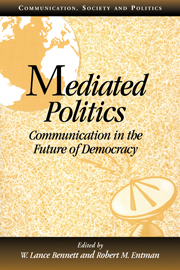Book contents
- Frontmatter
- Contents
- List of Figures
- List of Tables
- Contributors
- Preface
- Acknowledgments
- 1 Mediated Politics: An Introduction
- Part 1 Democracy and the Public Sphere
- 2 The Public Sphere and the Net: Structure, Space, and Communication
- 3 Promoting Political Engagement
- 4 The Internet and the Global Public Sphere
- Part 2 Citizens, Consumers, and Media in Transition
- Part 3 Mediated Political Information and Public Opinion
- Part 4 Mediated Campaigns
- Part 5 Citizens: Present and Future
- Index
4 - The Internet and the Global Public Sphere
Published online by Cambridge University Press: 05 June 2012
- Frontmatter
- Contents
- List of Figures
- List of Tables
- Contributors
- Preface
- Acknowledgments
- 1 Mediated Politics: An Introduction
- Part 1 Democracy and the Public Sphere
- 2 The Public Sphere and the Net: Structure, Space, and Communication
- 3 Promoting Political Engagement
- 4 The Internet and the Global Public Sphere
- Part 2 Citizens, Consumers, and Media in Transition
- Part 3 Mediated Political Information and Public Opinion
- Part 4 Mediated Campaigns
- Part 5 Citizens: Present and Future
- Index
Summary
INTRODUCTION
The issue discussed in this chapter has been vividly illustrated by the recent world financial crisis. Major decisions, affecting the lives of millions of people, have been made by organizations like the World Bank and the International Monetary Fund (IMF). Many of these decisions have been made in secret by appointees over whom there is no democratic control. Such proceedings have been criticized, not only by those whose lives have been transformed by the changes, but also by people wholly committed to the operations of international capitalism. Jeffrey Sachs, panegyrist for the freest of free markets and the most enthusiastic advocate of shock therapy for ailing economies from Poland to Peru, is one such critic. Writing about the IMF in the Financial Times, the main newspaper of European business, he argued that the “situation was out of hand” and that there had to be a new openness and debate about its policies (Sachs 1997). The same general point has been made more formally and academically by other writers (Garnham 1992; Hjarvard 1993). The development of a global economy, and of political institutions that operate at the supranational level, call for the creation of a global public sphere. In this forum their policies can be subjected to the same kind of rational scrutiny as that which, in principle, those of the United States, or any other country with democratic pretensions, experience.
This chapter will explore some of the issues involved in that challenge. I will first make some brief remarks clarifying the ways in which I am here using the term “public sphere.”
- Type
- Chapter
- Information
- Mediated PoliticsCommunication in the Future of Democracy, pp. 75 - 96Publisher: Cambridge University PressPrint publication year: 2000
- 12
- Cited by



